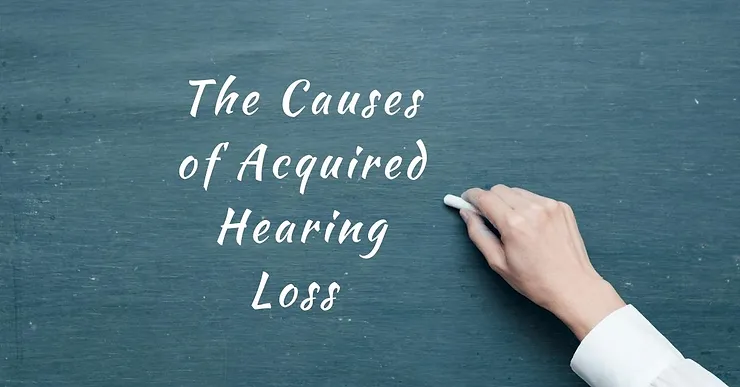
In America today, about 0.3% of children are born with measurable hearing loss. Above the age of 18, 15% of people report having problems hearing. Suffice it to say: the vast majority of people with hearing loss acquired it at some point in their lives, rather than being born with it. While age-related hearing loss is perhaps the most common type of acquired hearing loss, let’s take a look at a few others.
Ear Infections
Middle ear infections (otitis media) are one of the most common illnesses to occur in children. Most of us have had an ear infection or two. They are more common in children because the auditory tube does not acquire its downward angle into the throat until adolescence, making it easier for upper respiratory tract infections to travel into the middle ear.
While acute ear infections last a day or a few days, chronic ear infections can last much longer. Frequent acute ear infections are also labeled as chronic ear infections.
Hearing loss often occurs with ear infections due to the presence of fluid in the middle ear. Once the infection subsides and the fluid evacuates the middle ear, hearing returns to normal in most cases. It’s rare, but sometimes permanent damage can occur. An ear infection that lasts more than a day or two should be seen by a doctor.
Swimmer’s ear (otitis externa) is an infection in the ear canal that occurs in people of all ages. It can result from swimming, or from putting cotton swabs into the ear canal. Even extensive use of earbuds can be a cause of swimmer’s ear. Hearing loss can occur due to the swelling shut of the ear canal. Once the infection subsides, hearing will return to normal. In most cases, the flushing action of earwax will eliminate the infection, but if it lasts more than a few days you should see your doctor.
Chemicals and Medicines
There are some 750 chemicals that can cause hearing loss. Certain types of paint, thinners, degreasers, glues, and engine exhaust can damage the cilia – tiny, hair-like cells – inside the cochlea in the inner ear. Some life-saving medicines, such as some types of chemotherapy, may also cause hearing loss as a side effect. Your doctor should make you aware of this possibility before administering or prescribing any drugs that are known to cause hearing loss as a side effect.
Other Medical Problems
General inflammation in the body, which can also cause cardiovascular disease, has been documented to accelerate the progress of age-related hearing loss. Other, more temporary illnesses and infections can leave the sufferer with permanent hearing loss once they are healed. While it is rare, people have been known to have hearing loss in the wake of being struck by encephalitis, influenza, meningitis, mumps, measles or chickenpox.
Military Veterans and Hearing Loss
Tinnitus (ringing in the ears) and hearing loss are the two most common medical concerns for veterans returning from combat. Military personnel are exposed to a lot of loud sounds from training up through combat. Weapons report, loud vehicles, head injuries and blast vibrations all contribute to hearing loss.
Noise-Induced Hearing Loss
Any hearing loss that results from overexposure to loud sounds is called noise-induced hearing loss (NIHL). As many as 20% of American teenagers today have measurable NIHL in one or both ears. The most likely cause of the elevation in cases in recent decades is the increased use of personal listening devices like earbuds.
Head Injuries
Head injuries from sports are also a frequent cause of hearing loss. Even minor but routine head traumas, like an American football player experiences on a regular basis, can cause permanent hearing loss. These repeated injuries can damage the auditory nerve, causing what is called “hidden hearing loss,” where a person experiences noticeable hearing loss on a day to day basis but tests normal on a hearing test.
Seeking Treatment
If you experience a sudden hearing loss and suspect one of the causes above, you should see your doctor. Some infections require treatment. Some injuries result in abnormalities that might be surgically corrected. Damage to the eardrum can usually be corrected, and in some cases the eardrum might be replaced with a synthetic one.
If you’ve been living with hearing loss that is not curable, from whatever cause, you should make an appointment with an audiologist. Get a hearing test and see what treatments are recommended for you. Hearing aids today have come a long way and there’s a growing list of reasons that it’s important for your general health and well-being to use hearing aids. Contact us today to schedule an appointment!
